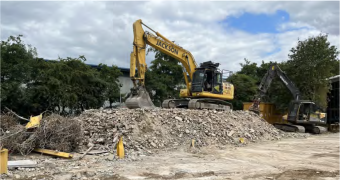What is a chartered surveyor and what do they do?
At its most basic a chartered surveyor’s job involves land, property and construction. They might be asked to value property and examine buildings for structural defects; they might also offer expert advice on environmental issues and construction. We take an in-depth look at what chartered surveyors do in relation to commercial property.
How are chartered surveyors classified?
Until 1999 chartered surveyors were classified by formal designations by their professional body, the Royal Institution of Chartered Surveyors (RICS). After this date, all RICS’s members were known simply as chartered surveyors, with information supplied to clients to inform them of the individual’s specialism.
All RICS members are post graduates, most having completed a degree in building surveying, and many have additional qualifications in areas such as urban and land studies, geography, science, economics or maths. RICS offers accreditation to individuals who have completed a range of construction- and property-related degrees, after which training must be undertaken before becoming a member of the organisation. This is to ensure that members of RICS hold appropriate and relevant qualifications and undertake Continuing Professional Development (CPD) which enables them to offer the most up-to-date advice to clients.
Which responsibilities do chartered surveyors have?
Qualified building surveyors play a vital role for both landlords and tenants as well as those purchasing or selling a commercial building. Qualified surveyors must abide by RICS Professional Standards, or- the Red Book- which provides guidance on best practice, and procedures for asset valuation – the most common area which surveyors are responsible for. Our RICS qualified commercial property surveyors specialise across the retail, office, industrial, and leisure sectors.
Commercial property valuation
If you’re in commercial property, in whatever capacity, you will have had dealings with a commercial property surveyor. In the first instance, you may have approached them in order to establish a valuation for your property. This is a key skill and has implications for bank lending, investment opportunities, accounting and taxation issues.
Purchasing or selling properties
Surveyors can also be appointed to deal with issues surrounding purchasing or selling a property, the management or leasing of premises (whether from a landlord’s or a tenant’s perspective) or portfolios and negotiations between landlords and tenants.
Dispute resolution
Another aspect of a surveyor’s work is dispute resolution which can encompass liaising between parties in cases of rent reviews, the renewal of leases, building contracts, disputes in planning cases, boundary disputes. RICS-qualified surveyors are often skilled negotiators and can advise on avoiding conflict and act as mediators in cases where parties cannot reach agreement.
Facility management
Surveyors might also be involved with facilities management – this area deals with issues such as health and safety, property management, services and utilities.
Finally, surveyors might be asked to value machinery, equipment and business assets – this can mean anything from a computer to an HGV. This side of the role plays an important part in insurance, insolvency, compulsory purchase, accounting, taxation and market value purposes.
As you can see, a commercial chartered surveyor’s work is not simple or straightforward. They carry a heavy responsibility of professionalism and care with them in their course of work, to ensure fairness and complete transparency at all times. At Eddisons, our RICS-qualified chartered surveyors have had many years’ experience in all aspects of their profession and can offer you impartial and expert advice on all matters relating to commercial property.
Experts in commercial property
Contact our team of leading auctioneers, property agents, and RICS-qualified surveyors today.












